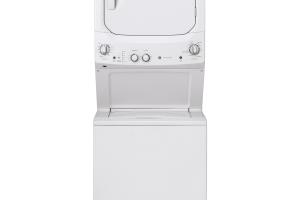Ultimate Guide on How to Buy a Stackable Washer and Dryer: Tips & Best Brands

-
Quick Links:
- Introduction
- Benefits of Stackable Washers and Dryers
- What to Consider When Buying
- Top Brands for Stackable Units
- Understanding Energy Efficiency Ratings
- Space Requirements and Installation
- Pricing and Budgeting
- Step-by-Step Buying Guide
- Case Studies and Real-World Examples
- FAQs
Introduction
In an era where space is a luxury, stackable washers and dryers have become a popular choice for homeowners and renters alike. These compact units not only save space but also offer efficiency and convenience. This guide will take you through everything you need to know about buying a stackable washer and dryer, from understanding their benefits and considerations to the best brands on the market.
Benefits of Stackable Washers and Dryers
- Space-Saving: Ideal for apartments and small homes.
- Efficient: Many models come with advanced features that save water and energy.
- Convenience: Having a washer and dryer in one location saves time.
- Easy to Use: User-friendly controls and settings.
What to Consider When Buying
1. Size and Dimensions
Measure the space where you plan to install your stackable unit. Ensure you account for door clearance and ventilation requirements.
2. Capacity
Choose a model that fits your laundry needs. Stackable units come in various capacities, typically ranging from 2.0 to 4.5 cubic feet.
3. Features
Look for features like:
- Multiple wash cycles
- Energy efficiency ratings
- Smart technology integration
- Noise reduction systems
4. Brand Reliability
Some brands have built a reputation for quality and durability. Research user reviews and expert opinions.
Top Brands for Stackable Units
Here are some of the leading brands in the stackable washer and dryer market:
- LG: Known for innovation and energy efficiency.
- Samsung: Offers advanced technology and sleek designs.
- Whirlpool: A reliable choice with a long history of quality appliances.
- Bosch: Renowned for compact and efficient European designs.
- GE Appliances: Offers a wide range of models with good customer service.
Understanding Energy Efficiency Ratings
Energy efficiency is crucial when purchasing appliances. Look for the Energy Star label, which indicates that the product meets strict energy efficiency guidelines set by the U.S. Environmental Protection Agency.
Space Requirements and Installation
Verify the installation area for your stackable washer and dryer. Ensure there is adequate space for ventilation, plumbing, and electrical connections. Some key points include:
- Ceiling height for stacking
- Proximity to water supply and drainage
- Access to electrical outlets
Pricing and Budgeting
The price of stackable washers and dryers can vary widely based on features, brand, and capacity. Here's a general breakdown:
| Price Range | Features |
|---|---|
| $500 - $800 | Basic models, fewer features |
| $800 - $1,200 | Mid-range, good capacity and features |
| $1,200 - $2,000+ | High-end, energy-efficient, smart appliances |
Step-by-Step Buying Guide
Follow these steps to ensure you make an informed decision:
- Measure Your Space: Ensure your space can accommodate a stackable unit.
- Determine Your Budget: Set a price range you're comfortable with.
- Research Brands: Compare brands and models based on reviews and reliability.
- Check for Energy Efficiency: Look for Energy Star rated models.
- Visit Showrooms: If possible, see the models in person.
- Read Reviews: Look for customer feedback on performance and durability.
- Make Your Purchase: Buy from a reputable retailer.
Case Studies and Real-World Examples
To illustrate the benefits of stackable washers and dryers, consider the following case studies:
Case Study 1: Urban Apartment Living
In a 600 sq. ft. studio apartment in New York City, the resident opted for a stackable washer and dryer unit, freeing up space for storage and a more functional living area.
Case Study 2: Family Home
A family of four in a suburban house replaced their traditional laundry setup with a stackable unit, reducing laundry time and improving energy efficiency by 30%.
FAQs
1. What is a stackable washer and dryer?
A stackable washer and dryer are two separate appliances that can be stacked on top of each other to save space.
2. How much space do I need for a stackable washer and dryer?
You typically need a minimum of 5 feet of vertical space and adequate room for water connections and ventilation.
3. Are stackable washers and dryers efficient?
Yes, many stackable units are designed to be energy-efficient, helping you save on utility bills.
4. Can I install a stackable washer and dryer myself?
While some homeowners can install them, it's recommended to hire a professional for proper setup.
5. What are the best brands for stackable washers and dryers?
Top brands include LG, Samsung, Whirlpool, Bosch, and GE Appliances.
6. How do I maintain my stackable washer and dryer?
Regularly clean the lint filter, check hoses for leaks, and schedule professional maintenance annually.
7. What features should I look for?
Consider features like multiple wash cycles, smart technology, and energy efficiency ratings.
8. How do I determine the right capacity?
Choose based on your laundry frequency; larger capacities are better for families.
9. Are stackable units more expensive?
They can be more expensive upfront, but their energy efficiency may save you money in the long run.
10. Where can I buy stackable washers and dryers?
They are available at appliance retailers, department stores, and online marketplaces.
For more information, check out these resources:
- U.S. Department of Energy - Energy Saver
- Consumer Reports - Appliances
- Energy Star - Energy Efficient Products
Random Reads
- Teaching facebook to seniors
- Improve radio reception
- Increase microphone volume android
- Maximizing your ipad experience chrome extensions
- Mediawiki installation guide
- How to set time to night in minecraft
- How to remove gold from circuit boards
- How to remove grout
- Log out youtube
- Log out google drive